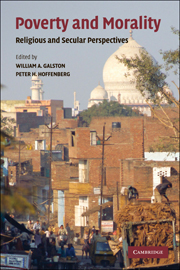Book contents
- Frontmatter
- Contents
- Contributors
- Acknowledgments
- 1 Introduction
- 2 Global Poverty and Unequal Development
- 3 The Karma of Poverty
- 4 Poverty and Morality in Christianity
- 5 Classical Liberalism, Poverty, and Morality
- 6 Confucian Perspectives on Poverty and Morality
- 7 Poverty and Morality
- 8 Hinduism and Poverty
- 9 The Problem of Poverty in Islamic Ethics
- 10 Jewish Perspectives on Poverty
- 11 Liberal Egalitarianism and Poverty
- 12 Marxism and Poverty
- 13 Poverty and Natural Law
- 14 Afterword
- Select Bibliography
- Index
14 - Afterword
Published online by Cambridge University Press: 05 June 2012
- Frontmatter
- Contents
- Contributors
- Acknowledgments
- 1 Introduction
- 2 Global Poverty and Unequal Development
- 3 The Karma of Poverty
- 4 Poverty and Morality in Christianity
- 5 Classical Liberalism, Poverty, and Morality
- 6 Confucian Perspectives on Poverty and Morality
- 7 Poverty and Morality
- 8 Hinduism and Poverty
- 9 The Problem of Poverty in Islamic Ethics
- 10 Jewish Perspectives on Poverty
- 11 Liberal Egalitarianism and Poverty
- 12 Marxism and Poverty
- 13 Poverty and Natural Law
- 14 Afterword
- Select Bibliography
- Index
Summary
These are engaging and insightful essays, and it has been illuminating to watch them grow, from the first drafts circulated before the Ethikon conference in March 2008, to the conference discussions, to the revised and final versions. After reading the final versions, I went back and reread Michael Harrington’s The Other America, still one of the best accounts of poverty in the United States, though much has changed since it was published in 1962. Harrington’s perspective might best be called “social-democratic” – he is the advocate of a strong welfare state. As one of the participants in the Ethikon conference pointed out, this was a perspective missing among the essay writers. It is closely related to, but also different from, the arguments found in the essays on Marxism and egalitarian liberalism. Because my own views are social democratic in character, I will represent that perspective in this commentary on the collected essays. But I will try as best I can to do justice to the very different views described by our authors.
Poverty is a good topic through which to address the differences among religious and political-philosophical traditions because, as the Bible says, it is always with us – has always been and will always be with us, at least until the messianic age. Ethikon topics like “civil society” have been harder, especially for people writing out of the religious traditions, who can plausibly say that there was no such thing as civil society when their canonical texts were written. But poverty is a commonplace of religious as well as secular argument. And the terms of the argument are mostly common also. I am going to describe them as a series of polarities – voluntary-involuntary, deserving-undeserving, private-public, particular-universal, among others – even though I understand that polar oppositions often misrepresent the nuances and complexities of the contrasted arguments. I will point out some of the misrepresentations, but the polarities will give readers a useful overview of what is at stake in the ongoing discussion.
Keywords
- Type
- Chapter
- Information
- Poverty and MoralityReligious and Secular Perspectives, pp. 285 - 294Publisher: Cambridge University PressPrint publication year: 2010
- 1
- Cited by

